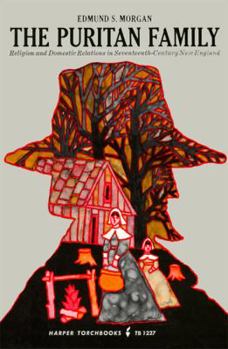Puritan Family
Select Format
Select Condition 
Book Overview
The Puritans came to New England not merely to save their souls but to establish a visible kingdom of God, a society where outward conduct would be according to God's laws. This book discusses the desire of the Puritans to be socially virtuous and their wish to force social virtue upon others.
Format:Paperback
Language:English
ISBN:0061312274
ISBN13:9780061312274
Release Date:January 1966
Publisher:Harper Perennial
Length:208 Pages
Weight:0.46 lbs.
Dimensions:0.5" x 5.3" x 8.0"
Customer Reviews
4 ratings
Wonderful Introduction to Puritan Culture and Belief
Published by Thriftbooks.com User , 21 years ago
The professor who required this book in the class I took a few years ago knows the author, Edmund Morgan, personally. She told a story of how she and several other professors were having dinner with Morgan during a History convention. One professor remarked that Morgan's resume must be as thick as a book due to his successful career. Morgan responded that he had no resume and the other professors realized that if Morgan needed funding for a certain project, his name was all that was needed. After reading this book, I can understand why Morgan is so respected in his field. Not only is this work well researched but the writing style is very engaging. Morgan covers the following topics: Puritan ideology and views on freedom; marriage (a husband's authority was actually more limited than in other societies); parents and children (children-even girls-left home to live with their master as an apprentice in their chosen, or their parent's chosen, calling or, in the case of girls, house keeping); the importance of early education; punishment; masters and servants (a master was as responsible for the soul of his servant as he was for the soul of his child); the church and social order (Puritans should live in families as solitude was cause for suspicion); and tribalism. In the first chapter, Morgan explains the paradox between good conduct and salvation in Puritan belief. Good conduct was regarded as the result of salvation not the cause of it. . Anyone interested in Puritan life will find this 186-page book an excellent introduction.
Excellent and balanced survey of a unique people
Published by Thriftbooks.com User , 24 years ago
I wasn't sure whether this was going to be a positive or a negative survey of Puritan life and times when I started reading it. Most people don't have very many nice things to say about them- usually comments about black clothing and the Salem witch trials. But the truth is, although the Puritans had plenty of problems, they've gotten a bit of a bad rap in history. They were actually far more lively and earthy than most people would suspect; they had much more in common with Shakespeare's times than with Victorian England.And so Morgan's thesis is not that the Puritan's were ascetics or prudes- they weren't. Rather, their real fault lay in a sort of 'Christian tribalism', in the belief that since the elect in any generation were few in number anyway, they could avoid evangelism in favor of spiritual isolationism. Since the reasoned that the Church of one generation was generally comprised of the children of the last generation, their only real task was to preach to the choir. And so they fell into a decay of the soul that manifested itself as outward prosperity and inward apathy. Their zeal dissipated into mere trans-generational commercial institutionalism and snobbery. And so the foundation they laid down gradually faded into the overall fabric of a quickly growing Colonial society.But in spite of their faults, the Puritans contributed a vast amount of effort and philosophy towards the make-up of American society today. And although they may be remembered for their obsessions with the devil and witches, they were not in fact the sum of their mistakes. It's easy to criticize in retrospect. Morgan's book helps provide a more thorough understanding of the why's and not just the what's of their history. Once the reader comes to an understanding of how the Puritans thought, he will have more appreciation for their contributions and more charity in his assessment of their foibles.The Puritan Family was an admirably balanced study of a people with a colorful past. It was first published over 50 years ago, and it certainly won't alter current perceptions of what Puritanism was, but it's still a very informative read for anyone who is interested in the truth, and not in stereotypes.
Early work by a scholarly giant
Published by Thriftbooks.com User , 24 years ago
This is the (slightly revised) doctoral dissertation by Edmund Morgan, one of the most renowned of all American historians. It analyzes Puritan society by exploring the relationships among these early New Englanders. Although he discusses master-servant relationships, his main focus is on the family. The reason for this is that the Puritans saw the family as the highest social institution, and as the foundation of their churches and government. Indeed, he shows how the family relationship is extended to explain their relationship to God (ie-they saw themselves as both the sons of God and as the bride of Christ).It is one of Morgan's earliest works, and the concluding chapter sets the stage for his later "Visible Saints: The History of a Puritan Idea." No serious student of colonial New England can neglect this book, if only because of the enormous impact of its author.
Right on Target
Published by Thriftbooks.com User , 25 years ago
This work provides a wonderful analysis of the intricacies of dailyn life in the 17th century. Although it may seem a dry subject, it is actually fascinating to learn about, and provides the reader with a great understanding of the real people that lived so long ago.





